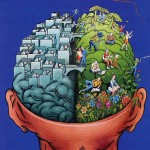 I read a joke on Facebook, a witty play on words:
I read a joke on Facebook, a witty play on words:
My left brain has nothing right,
My right brain has nothing left.
The wit obviously lies in intentionally confusing two pairs of homophones, namely left as a direction and left as the past participle of leave, and right as a direction and right meaning proper and correct.
After a smirk or two, my inquisitiveness compelled me to ask questions. Are these words homophones by chance, or are they actually related to each other somehow?
